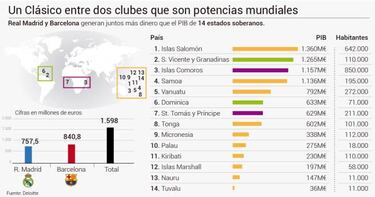Real Madrid and Barça generate more revenue than 14 countries
Last year, the two clubs generated a combined income of 1,596 million euros, more than the GDP of countries such as Samoa or the Solomon Islands.

If El Clásico were a soverreign state, it would have more economic power than 14 countries. In the last financial year, Real Madrid and Barcelona generated a combined income of 1,596 million euros - a figure greater than the gross domestic product (GDP) produced by the ecomonies of Samoa, The Solomon Islands, Tonga, Dominica and Micronesia... An indication of just what will be in play later this evening at the Bernabéu.
With almost 1,600M euros in annual income, Madrid and Barça top the world ranking of revenue generating clubs in a report published by accountancy company Deloitte and both clubs' coffers haven't stopped growing. Madrid are hoping to post even better figures this year with an 8.6 per cent increase (65 million euros) in revenue while Barça hope to see a 5.8% improvement on their annual figures (57 million euros).
Related stories
Two football heavyweights who are willing to open new frontiers to continue generating revenue - and not just have their fanbase contained within Spain. "Real Madrid is a universal club," Florentino Pérez has said on many occasions. Bartomeu meanwhile has talked about "and undeniable global projection". Using their social media platforms as a yardstick (Madrid and Barça have a combined 478.5 million followers) together with television audience (650 million viewers watched the last Clásico), the two clubs have enormous earning power.

Stadium tours attract more visitors than tourists in Ecuador
Without even counting gate receipts for game at Bernabéu and Camp Nou, just for the stadium tours that both club organise at their respective homes (The Bernabéu Tour costs €25 and the Camp Nou Experience starts at €26) attract a combined total of 2.3 million visitors every year. Comparing that to tourist figures, that number exceeds the total amount of tourists who visited Slovakia (2.2 million), Ecuador (1.7 million), Nigeria (1.9 million) and Lebanon (1.8 million) during the course of last year.

